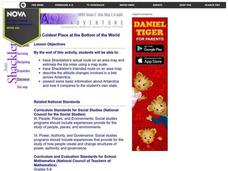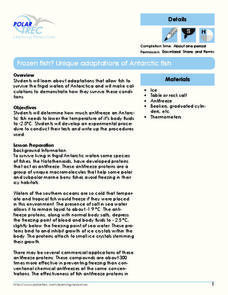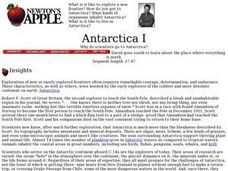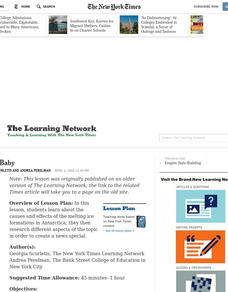Curated OER
Survival in Antarctica
Explore the harsh climate of Antarctica and its wildlife. Participate in experiments to determine how humans survive in the continent's climate, and address the difficulties faced by scientists.
Polar Trec
Science in Antarctica
PolarTREC brings polar researchers and educators together to benefit both science and education. Pupils select one research project in Antarctica to explore and present to their peers. Scholars polish research and presentation skills as...
Curated OER
Past Time: Vocabulary Practice
In this past time worksheet, students select the word or phrase from 3 choices that means the same as the word in bold in 12 sentences. All pertain to events in the past.
Curated OER
Total English Advanced: Linking Words of Time and Contrast
In this linking words of time and contrast activity, students fill in the blanks in 10 sentences with the appropriate words from the word bank and then use 5 of the linking words to write a paragraph.
Curated OER
The Coldest Place at the Bottom of the World
Students research and trace Shackleton's actual and intended route on an area map. They analyze the altitude changes involved in a trek across Antarctica and complete a worksheet comparing Antarctica to their own state.
Polar Trec
Where in the World Is Our Teacher?
Kirk Beckendorf, a middle school teacher, joined researchers at the McMurdo Station in Antarctica to help maintain automatic weather stations. The lesson encourages pupils to track his travels around the region. They connect with the...
Polar Trec
Frozen Fish? Unique Adaptations of Antarctic Fish
Some fish contain proteins that act like antifreeze in order for them to live in the frigid waters of Antarctica! High schoolers determine how much antifreeze a fish needs to lower its body temp to -2.5 degrees. Teachers act as a...
Reed Novel Studies
Mr. Popper's Penguins: Novel Study
Antarctica is actually a desert. Using the novel study that explores Mr. Popper's Penguins, pupils find four of their own interesting facts about the amazing continent. They also practice putting words in alphabetical order and answer...
Curated OER
Antarctica I
Students explore exploring and expiditions then simlate their own on campus. They divide into small "expedition groups." Have each team report back to the class about their expeditions, using written, oral, or videotaped presentations.
Curated OER
Vocabulary Practice With Past Time
In this word meanings activity, students practice their vocabulary skills while using the past tense. Students complete twelve multiple choice questions where they choose the correct meaning of the bold word in each sentence.
Curated OER
A Day in a Life of an Arctic/Antarctic Animal
Students, through video segments, explore what types of animals live in the Arctic and Antarctica. They also clear up any misconceptions they have about penguins or polar bears.
Curated OER
ANIMALS OF ANTARCTICA
Students are introduced to the animals of Antarctica and how they adapt to their environment and the changes of the seasons after being read the story,"Counting Penguins" . They pick an animal and predict how he/she thinks this animal...
Curated OER
Reading Comprehension: Antarctica
In this comprehension activity, learners read a short passage about Antarctica, then complete 3 short answer questions. Worksheet contains link to additional activities.
Curated OER
Ice, Ice, Baby
Students explore the causes and effects of the melting ice formations in Antarctica; they then research different aspects of the topic in order to create a news special.
Consortium for Ocean Science Exploration and Engagement (COSEE)
Carbon Dioxide & Krill: Impacts
What effects do temperature and carbon dioxide levels have on the zooplankton of Antarctica? This concluding lesson plan in a short unit on climate change and the ocean helps environmental scientists answer these questions. After...
Consortium for Ocean Science Exploration and Engagement (COSEE)
Ocean Acidification: Whats and Hows
Open this instructional activity by demonstrating the production of acidic carbon dioxide gas by activated yeast. Emerging ecologists then experiment with seashells to discover the effect of ocean acidification on shelled marine...
US Environmental Protection Agency
Sea Level: On the Rise
With the global temperature on the rise, the effects of climate change are starting to be seen. However, many people have a difficult time conceptualizing the long-term effects, such as sea levels rising. Given an easy and effective...
Mr. Nussbaum
Penguins
Penguins are the topic of an informational text that scholars read or listen to, then answer 10 multiple-choice questions.
Curated OER
Stories That Go with the Territory
Students investigate various expeditions throughout history to new and/or uncharted territories. They work in groups to develop and 'produce' television news magazine segments about some of these historic expeditions.
Curated OER
Antarctic Exploration
In December of 2011, the New York Times released an article describing new investigations of old Antarctic explorations. Your class will read the article then answer 12 related comprehension questions.
Polar Trec
Ice Cores: Modeling Ice Sheets
Ice cores provide scientists with knowledge of historic melt layers, air temperatures, greenhouse gases, and climate stability. Scholars work in groups to build layers representing snow and ice over thousands of years. Then, groups...
American Museum of Natural History
What's This? Breathing
Crazy fact: Some animals can survive months without oxygen. An online resource describes some unique ways animals collect oxygen and even live without it for an extended time. Learners read about these special animals and use pop-up...
Illustrative Mathematics
Comparing Temperatures
Which is colder -12 or -18? Temperature is natural real-world application of ordering rational numbers. It's also fun to talk about the lowest recorded temperature on Earth. Take the time to discuss this inquiry with your class.
Curated OER
The Oceans, Waves, Tides & Currents
Your introductory lesson to oceanography can be outlined with this apropos presentation. It touches on the physical features of the ocean floor, waves, tides, and currents. One small issue is that some of the graphics are not of the...

























